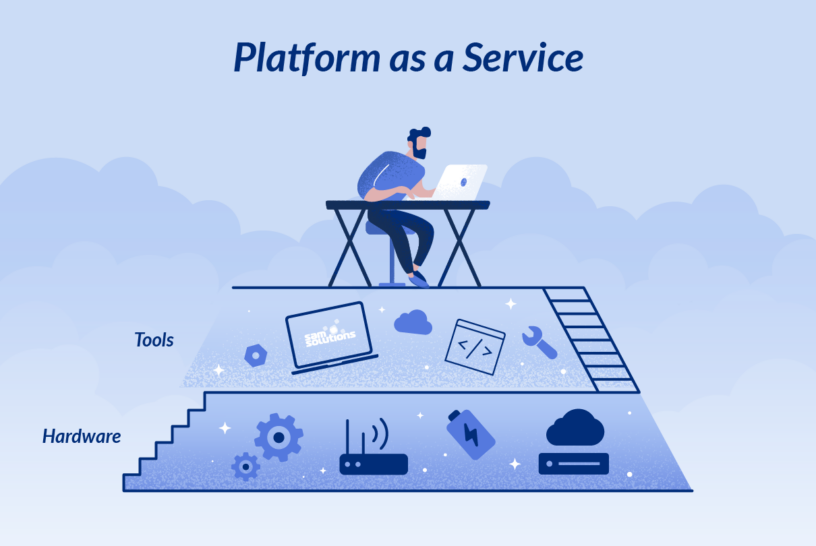Introduction: Platform as a Service (PaaS) is a cloud computing service model that provides a platform allowing customers to develop, run, and manage applications without the complexity of building and maintaining the underlying infrastructure. PaaS delivers a framework that developers can build upon to create customized applications, offering essential services such as database management, development tools, middleware, and operating systems.
Market Trends:
- Growth of Multi-Cloud Strategies: Organizations are increasingly adopting multi-cloud strategies, utilizing PaaS solutions from multiple cloud providers to avoid vendor lock-in and improve flexibility.
- Rise of AI and Machine Learning PaaS: The demand for AI and machine learning capabilities is driving the growth of specialized PaaS offerings that enable developers to integrate these technologies into their applications without needing deep expertise in AI/ML.
- Increased Focus on Security and Compliance: As data privacy regulations become more stringent, PaaS providers are enhancing their security features and compliance certifications to meet the needs of businesses in regulated industries.
Market Dynamics:
- Drivers:
- Demand for Rapid Application Development: PaaS solutions accelerate the development process by providing pre-built tools and components, enabling faster time-to-market for applications.
- Cost Efficiency: PaaS reduces the need for investing in and maintaining physical infrastructure, leading to significant cost savings for businesses.
- Scalability: PaaS platforms offer automatic scalability, allowing businesses to easily adjust resources based on demand without manual intervention.
- Restraints:
- Vendor Lock-In: Dependence on a single PaaS provider can lead to vendor lock-in, making it difficult for businesses to switch providers or migrate applications.
- Integration Challenges: Integrating PaaS solutions with existing on-premise systems or other cloud services can be complex, requiring significant technical expertise.
- Opportunities:
- Expansion of Industry-Specific PaaS: There is a growing demand for PaaS solutions tailored to specific industries, such as healthcare, finance, and manufacturing, offering specialized tools and compliance features.
- Growth in Emerging Markets: The rapid digital transformation in emerging markets presents opportunities for PaaS providers to expand their footprint and cater to new customer segments.
Key Points:
- Customization and Flexibility: PaaS platforms offer extensive customization options, enabling businesses to create applications that meet their specific needs.
- Support for DevOps Practices: PaaS solutions are increasingly incorporating DevOps tools, facilitating continuous integration and continuous deployment (CI/CD) processes.
- Hybrid PaaS Solutions: The rise of hybrid cloud environments has led to the development of hybrid PaaS solutions that allow businesses to deploy and manage applications across both on-premise and cloud environments.
Market Insights: The PaaS market is characterized by rapid innovation, with providers continually enhancing their offerings to meet the evolving needs of developers and businesses. The market is highly competitive, with major cloud providers such as Amazon Web Services (AWS), Microsoft Azure, and Google Cloud leading the way. However, niche players offering specialized PaaS solutions are also gaining traction.
Benefits:
- Reduced Development Time: PaaS provides a comprehensive development environment with pre-configured tools, reducing the time required to build and deploy applications.
- Lower Operational Costs: By eliminating the need for infrastructure management, PaaS allows businesses to focus on development and innovation, leading to cost savings.
- Enhanced Collaboration: PaaS platforms facilitate collaboration among development teams by providing shared environments and tools accessible from anywhere.
Challenges:
- Security Concerns: As PaaS involves hosting applications and data on third-party servers, security and data privacy concerns are significant challenges, especially for businesses in regulated industries.
- Complexity in Migration: Migrating existing applications to a PaaS environment can be complex and may require significant re-architecting of the application.
- Limited Control Over Infrastructure: While PaaS provides flexibility in application development, businesses have limited control over the underlying infrastructure, which can be a drawback for some use cases.
𝐂𝐥𝐢𝐜𝐤 𝐇𝐞𝐫𝐞, 𝐓𝐨 𝐆𝐞𝐭 𝐅𝐫𝐞𝐞 𝐒𝐚𝐦𝐩𝐥𝐞 𝐑𝐞𝐩𝐨𝐫𝐭
https://stringentdatalytics.com/sample-request/platform-as-a-service-market/14000/
Market Segmentations:
Global Platform as a Service Market:
#ByCompany
Salesforce
Apprenda
Amazon.com
Microsoft
SAP
Oracle
Engine Yard
Fujitsu
Red Hat
Global Platform as a Service Market:
#ByType
Public Cloud
Private Cloud
Hybrid Cloud
Global Platform as a Service Market:
#ByApplication
Banking & Financial Sector
Government & Public Sector
Healthcare & Life Sciences
Education
Consumer Goods & Retail
Telecommunications & IT
Others
Global Platform as a Service Market: Regional Analysis
The regional analysis of the global Platform as a Service market provides insights into the market’s performance across different regions of the world. The analysis is based on recent and future trends and includes market forecast for the prediction period. The countries covered in the regional analysis of the Platform as a Service market report are as follows:
North America: The North America region includes the U.S., Canada, and Mexico. The U.S. is the largest market for Platform as a Service in this region, followed by Canada and Mexico. The market growth in this region is primarily driven by the presence of key market players and the increasing demand for the product.
Europe: The Europe region includes Germany, France, U.K., Russia, Italy, Spain, Turkey, Netherlands, Switzerland, Belgium, and Rest of Europe. Germany is the largest market for Platform as a Service in this region, followed by the U.K. and France. The market growth in this region is driven by the increasing demand for the product in the automotive and aerospace sectors.
Asia-Pacific: The Asia-Pacific region includes Singapore, Malaysia, Australia, Thailand, Indonesia, Philippines, China, Japan, India, South Korea, and Rest of Asia-Pacific. China is the largest market for Platform as a Service in this region, followed by Japan and India. The market growth in this region is driven by the increasing adoption of the product in various end-use industries, such as automotive, aerospace, and construction.
Middle East and Africa: The Middle East and Africa region includes Saudi Arabia, U.A.E, South Africa, Egypt, Israel, and Rest of Middle East and Africa. The market growth in this region is driven by the increasing demand for the product in the aerospace and defense sectors.
South America: The South America region includes Argentina, Brazil, and Rest of South America. Brazil is the largest market for Platform as a Service in this region, followed by Argentina. The market growth in this region is primarily driven by the increasing demand for the product in the automotive sector.
Click Here, To Buy Premium Report
https://stringentdatalytics.com/purchase/platform-as-a-service-market/14000/?license=single
Key Questions Answered in This Report:
1. What is Platform as a Service (PaaS), and how does it differ from other cloud service models like IaaS and SaaS?
2. What are the key benefits of using PaaS for businesses and developers?
3. What factors are driving the growth of the PaaS market?
4. What challenges do organizations face when adopting PaaS solutions?
5. Who are the leading vendors and key players in the PaaS market?
6. What are the latest trends and innovations shaping the PaaS market?
7. How does PaaS support the development and deployment of applications across different industries?
8. What role does PaaS play in the broader cloud computing ecosystem?
9. What opportunities for growth and expansion exist within the PaaS market?
10. What is the future outlook for the Platform as a Service market?
About Stringent Datalytics
Stringent Datalytics offers both custom and syndicated market research reports. Custom market research reports are tailored to a specific client’s needs and requirements. These reports provide unique insights into a particular industry or market segment and can help businesses make informed decisions about their strategies and operations.
Syndicated market research reports, on the other hand, are pre-existing reports that are available for purchase by multiple clients. These reports are often produced on a regular basis, such as annually or quarterly, and cover a broad range of industries and market segments. Syndicated reports provide clients with insights into industry trends, market sizes, and competitive landscapes. By offering both custom and syndicated reports, Stringent Datalytics can provide clients with a range of market research solutions that can be customized to their specific needs.
Contact Us
Stringent Datalytics
Contact No- +1 346 666 6655
Email Id- sales@stringentdatalytics.com
Web- https://stringentdatalytics.com/




Leave a Reply